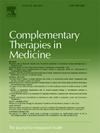Effect of emotional freedom techniques in mitigating pain catastrophizing following total knee arthroplasty
IF 3.5
3区 医学
Q1 INTEGRATIVE & COMPLEMENTARY MEDICINE
引用次数: 0
Abstract
Background
Up to 30 %-42 % of patients with end-stage knee osteoarthritis who undergo total knee arthroplasty may experience chronic pain and even pain catastrophizing following surgery. Pain catastrophizing is a negative thought pattern and cognitive bias that involves rumination,exaggeration,and emotions of powerlessness over pain, resulting in delayed rehabilitation and a lower quality of life.
Objective
To examine the effect of a 4-week combined offline and online Emotional freedom techniques on pain catastrophizing, pain intensity, and pain sensitivity in patients following total knee arthroplasty, assessed at 1 week, 4 weeks, 3 months, and 6 months after surgery.
Methods
This study employed a quasi-experimental repeated-measures design, wherein participants were systematically allocated into a control group (n = 31) and an intervention group (n = 33) based on their chronological admission sequence. The control group received conventional postoperative care following total knee arthroplasty, while the intervention group was administered emotional freedom techniques in conjunction with standard postoperative care over a 4-week intervention period. The efficacy of the intervention was quantitatively evaluated through validated psychometric instruments, including the Pain Catastrophizing Scale, Numeric Pain Rating Scale, and Pain Sensitivity Questionnaire. Assessments were performed on the postoperative day 1, week 1, week 4, month 3, and month 6, to comprehensively evaluate the temporal dynamics of intervention effects.
Results
A statistically significant reduction was observed in both the total pain catastrophizing score and the rumination dimension from baseline to the 6-month post-intervention assessment (P < 0.001). However, no significant changes were detected in the magnification dimension between the 3-month and 6-month follow-up periods, nor in the helplessness dimension from the 4-week to 3-month follow-up. Pain severity demonstrated a significant decrease during the initial 3-month follow-up period, though no significant differences were observed at subsequent time points beyond 3 months.Additionally, pain sensitivity scores exhibited a significant reduction from pre-intervention to the 6-month post-intervention assessment (P < 0.001).
Conclusions
The 4-week emotional freedom techniques demonstrated significant efficacy in reducing pain catastrophization, pain intensity, and pain sensitivity among patients following total knee arthroplasty.Our study incorporated a comprehensive analysis of temporal effects, intergroup variations, and interaction effects to ensure robust and reliable findings.
情绪释放技术对减轻全膝关节置换术后疼痛的影响。
背景:高达30%-42%的接受全膝关节置换术的终末期膝关节骨性关节炎患者可能会经历慢性疼痛,甚至术后疼痛严重。疼痛灾难化是一种消极的思维模式和认知偏见,涉及对疼痛的反刍、夸大和无力情绪,导致康复延迟和生活质量降低。目的:探讨在全膝关节置换术后1周、4周、3个月和6个月进行为期4周的线下和线上情绪释放技术对患者疼痛灾难、疼痛强度和疼痛敏感性的影响。方法:本研究采用准实验重复测量设计,根据受试者入院时间顺序,将其系统地分为对照组(n=31)和干预组(n=33)。对照组在全膝关节置换术后接受常规的术后护理,而干预组在4周的干预期内给予情绪释放技术和标准的术后护理。通过有效的心理测量工具,包括疼痛灾难量表、数字疼痛评定量表和疼痛敏感性问卷,定量评估干预的效果。分别于术后第1天、第1周、第4周、第3个月和第6个月进行评估,综合评价干预效果的时间动态。结果:从基线到干预后6个月的评估,观察到总疼痛灾难评分和反刍维度均有统计学意义上的显著降低(p结论:4周情绪释放技术在减少全膝关节置换术后患者的疼痛灾难、疼痛强度和疼痛敏感性方面具有显着疗效。我们的研究综合分析了时间效应、群体间变化和相互作用效应,以确保研究结果稳健可靠。
本文章由计算机程序翻译,如有差异,请以英文原文为准。
求助全文
约1分钟内获得全文
求助全文
来源期刊

Complementary therapies in medicine
医学-全科医学与补充医学
CiteScore
8.60
自引率
2.80%
发文量
101
审稿时长
112 days
期刊介绍:
Complementary Therapies in Medicine is an international, peer-reviewed journal that has considerable appeal to anyone who seeks objective and critical information on complementary therapies or who wishes to deepen their understanding of these approaches. It will be of particular interest to healthcare practitioners including family practitioners, complementary therapists, nurses, and physiotherapists; to academics including social scientists and CAM researchers; to healthcare managers; and to patients. Complementary Therapies in Medicine aims to publish valid, relevant and rigorous research and serious discussion articles with the main purpose of improving healthcare.
 求助内容:
求助内容: 应助结果提醒方式:
应助结果提醒方式:


